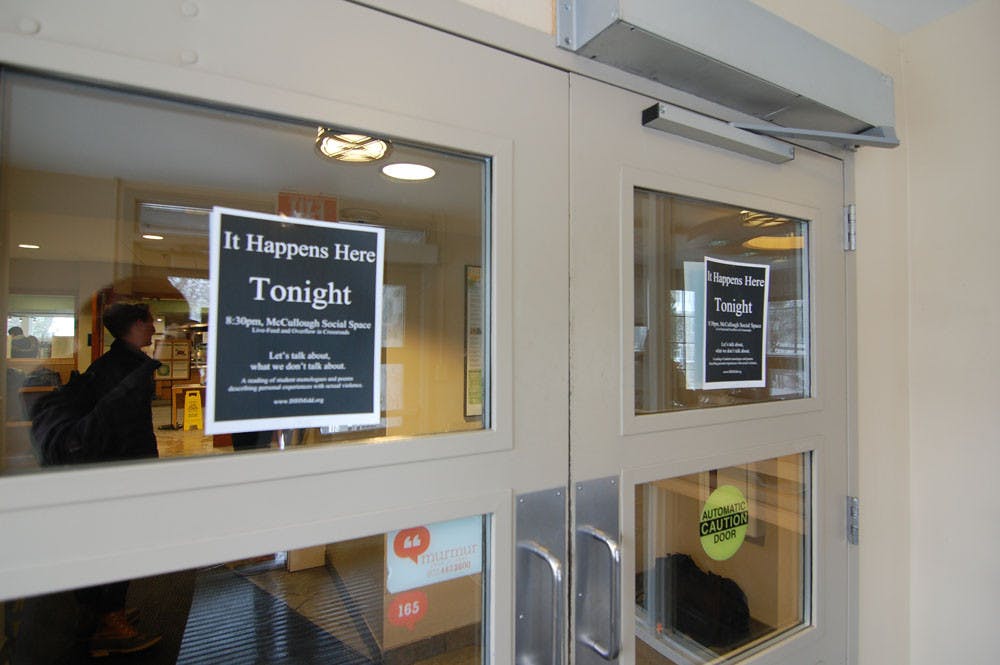You cannot avoid them as you walk around campus. The black posters with white writing that reads, “It Happens Here” plaster every door in the Proctor entryway, line the glass on your way into Ross, sit on all the tables in Atwater and coat the walls of the mail center. Sexual assault survivors work hard to convince themselves that they are safe on this campus. But It Happens Here, for better or for worse, works to remind us that we are not in a bubble.
Now in its third year, It Happens Here (IHH) has undeniably raised awareness of the sexual violence that affects students on our campus, tackling the problem through displays in the library, maps of where sexual assault has occurred and notably, the It Happens Here event that took place on Monday where students read aloud the powerful stories of their peers.
But such a powerful event has not only the ability to empower and but also to cripple. For many of the survivors whom IHH aims to support, such a public recollection of sexual assault is a trigger. The omnipresence of this issue in the dining halls and in our dorms makes it so people who struggle on an ordinary day to escape the haunted memory of their own assault find it particularly difficult to move forward. Such triggers unwillingly force these memories to the surface. While triggers exist everywhere and are different for different survivors depending on the circumstances of their assault, ubiquitous posters that explicitly state “It Happens Here” are a more blatant trigger than most.
Though IHH has the best intentions in promoting the event and shocking those who do not regularly think about sexual violence, let alone the sexual violence that occurs here with alarming frequency, the event must be promoted without creating an environment that makes survivors feel unsafe. By plastering these posters in our dining halls and dorms — the very places survivors should be able to feel a sense of normalcy and safety — we create an environment where the memories and threats of sexual assault are difficult to escape. Now that IHH is an established and well-attended event — this year they even planned for a live-stream for overflow in McCullough — such publicity tactics are no longer necessary. We at the Campus believe people go because of word of mouth rather than posters everywhere they look. IHH cannot be advertised the same way as a sports game or an improv show. It is an event that stirs painful memories for survivors and provokes uncomfortable realizations for others. We must be sensitive to the impact this has on our fellow community members and work to minimize triggers where we are able.
In a world where one in four women and one in 33 men will be sexually assaulted while in college, you never know who may be a survivor, who may overhear you talk to your friends as you wait in line for food, who may have had to muster great courage to submit a story or even walk past a sea of posters. We should walk away from IHH thinking more critically about how our actions impact others and how we can protect them.
We should tactfully advertise IHH and we should discuss our reactions to it, but we must do so with discretion. Posters should have been placed in a way that could be avoided for those too uncomfortable to walk past them, while still being visible for those who want to know the event information. Discussions must be sensitive to the trials sexual assault victims confront every single day as they work to move past this trauma. It is difficult to balance the two needs we face: the need to educate those who perpetuate rape culture on this campus and the need to protect those who have suffered from it. But as a community, we will be stronger because of it.
For some survivors, sharing their stories and hearing those of others can be an empowering and healing experience, letting them know they are not alone. It provides a vigil-like space to the trauma they have experienced. IHH provides a unique forum as the only widely attended annual event on sexual violence, and its impact could be scaled up by incorporating more proactive measures. This change can occur in the event itself, harnessing the existing hype to transition into productive dialogues through breakout groups or a period of reflection in the wake of the stories. Or perhaps IHH should be one part in a series of events rather than the singular event. It could also occur through increased programming during orientation and throughout the year, being wary of mandatory programming out of sensitivity towards survivors. Thanks to our recently received Department of Justice grant of $272,528, the financial support is there. Though the College has not been perfect on sexual assault in the past, this grant presents an opportunity to start anew. By integrating better with the College, IHH has the potential to tap these resources and expand its influence beyond the existing sphere.
Another strategy to help survivors of sexual assault is MiddSafe, the confidential peer support network for students affected by sexual assault, relationship violence, and other personal violations, aimed to aid students both through presence on campus and through a hotline, which is launching Friday.
We must move past the somber darkness of the black and white posters and incorporate more teal, the color of Sexual Assault Awareness and a color that connotes hope. Survivors do not need to be defined by their past experiences, nor should this campus united by raised awareness and a desire to fix what is broken. We can work to eliminate sexual violence at Middlebury, but we need to look forward, not back. It Happens Here, it is time to evolve.
It Happens Here: It’s Time to Evolve

Comments



